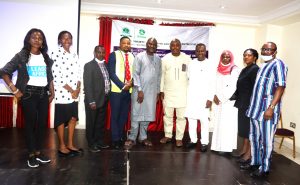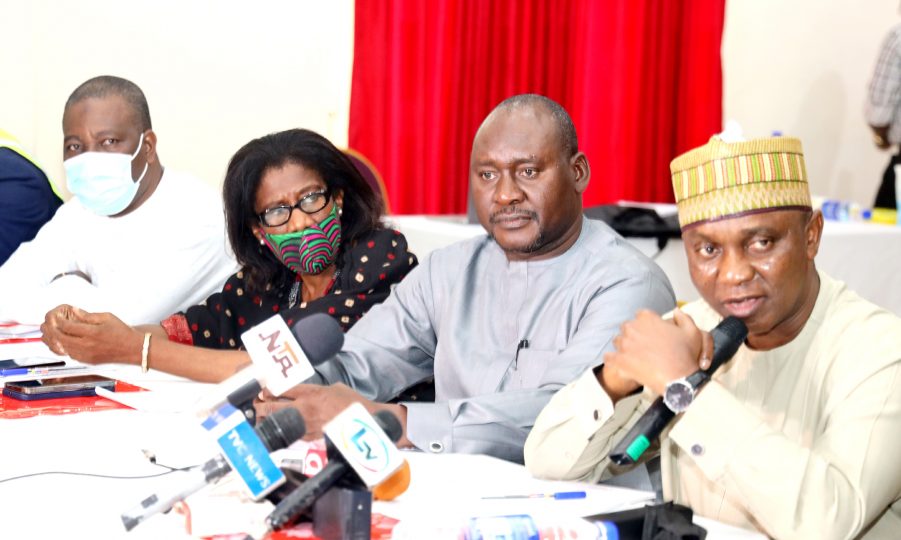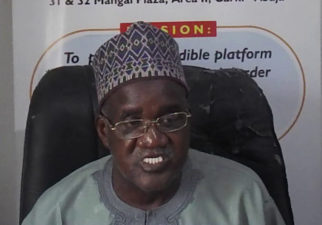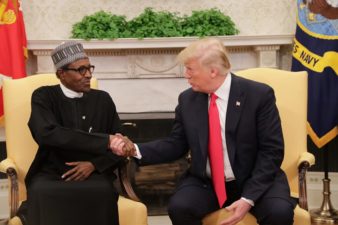By BASHIR ADEFAKA
“People who finance terrorism are using companies to do it. Some people work with foreign collaborators to come into Nigeria, take contracts and the moment the contracts are paid for, they don’t do it and they leave, eating the whole money. They also use companies. That is why we are working with the Corporate Affairs Commission (CAC) to ensure that we know who and which are the companies doing business in Nigeria to do what,” CISLAC boss said.
Following recent comment in Owerri, Imo State capital by President Muhammadu Buhari that fighting corruption in Nigeria is a very difficult task although not a challenge insurmountable and realisation in several quarters that financiers of terrorism and ethno-religious crisis in the country do so through ownership of companies, the Civil Society Legislative Advocacy Centre (CISLAC), on Wednesday 15 September, 2021 in Lagos, came up with a recommendation as regard steps that can be taken towards nipping the economic parasite in the bud.
CISLAC, making this recommendation, harped on the importance of a Beneficial Ownership Register (BOR) in the war against corruption by the President Buhari’s Administration, saying this must take place against the backdrop of piloting a substantive monitoring of the Beneficial Ownership (BO) disclosure commitment of the Nigerian government at both the 2016 London Anti-Corruption Summit and the Open Government Partnership Initiative.
Recall that President Muhammadu Buhari, following his success in the 2015 elections, came to power for two major reasons of helping to kill corruption through a revived anti-corruption war programme before corruption killed Nigeria and also tackle the lingering security situation in the country at the time. On the anti-corruption war, at least, he can point to some progress.

A cross section of participant at the press briefing on the Anti- Corruption Potential of the Beneficial Ownership Register organised by CISLAC Iin Ikeja, Lagos, on Wednesday 15 September, 2021.
And this progress is evident in the fact that his administration has worked more closely with the United States, the United Kingdom and various Middle East countries to seize and repatriate assets from public officials that are suspected to have been purchased with illicit funds.
Nigeria’s leading anti-corruption agency, the Economic and Financial Crimes Commission (EFCC), has also become more active. It launched series of investigations into high profile corruption cases connected with former high-ranking public officials from previous administrations, in particular former cabinet officials, state governors and senior civil servants.
Various properties acquired through shoddy or corrupt means had also been retrieved from convicted public office holders, individuals and companies. CISLAC, also known as Transparency International-Nigeria (TI-N) with support from the Tax Justice Network – Africa (TJNA), has been following up in how anti-corruption war is prosecuted.
The civil society organisations have also been monitoring developments after the Beneficial Ownership (BO) disclosure commitment of the Federal Government of Nigeria at both the 2016 London Anti-Corruption Summit and the Open Government Partnership Initiative.
This informed the discussions around the importance of a Beneficial Ownership Register (BOR) in the war against corruption at a briefing themed: “The Anti-Corruption Potential of The Beneficial Ownership Register”, organised by CISLAC on Wednesday, September 15, 2021, held at Citi Heights Hotel in Lagos.
Leading the conversation, the Executive Director of the Civil Society Advocacy Centre (CISLAC), Malam Auwal Musa Rafsanjani, noted that transparency of ownership and control of companies, partnerships, trusts and other legal entities that can hold assets and open bank accounts is critical to the ability to determine where illicit funds are moving to and who is moving them.
According to Rafsanjani, “the Nigerian government has marked significant progress in the implementation of the beneficial ownership transparency as indicated by the signing of the Companies and Allied Matters (Amendment) Act 2020 and ongoing process towards the establishment of a central register for disclosure of all corporate entities in the country that would subsume and complement the beneficial ownership register for extractive sector companies already established by the NEITI in December, 2019.”
He said while the rapid uptake of beneficial ownership is significant, the quality, accuracy and utility of the data for its intended purpose of curbing Illicit Financial Flows (IFFs) are dependent on the right legislative framework being in place and the data conforming to the beneficial open data standards (BODS).
He said the capacity of the tax and customs authorities, policing and prosecution authorities, mandatory clause on beneficial ownership information to be provided when companies are incorporated or trusts registered, and the presence of a mandate to ensure that information provided by any entity is periodically updated and on a regular basis among others, have the capacity to hamper the effective implementation of this initiative regardless of how good it looks.
He also identified “enforcement ability to ensure that information is placed on the publicly accessible platform and modalities to verify declared information and false declarations, which should result in robust penalties,” as other challenges.
“Let us be clear that beneficial ownership and the more general issue of money laundering is not only a Nigerian or African problem. But as long as inefficiency and the lack of political will to sanitize our systems persist, consequences in the form of terrorism financing, trans-national organized crime, tax evasion and illegal enrichment of politically exposed persons will prevail.”
“We thus seek advocacy for identifying a verification process that ensures people in the official register are authentic- that is, they are who they say they are, authorized- that is those persons have agreed to be involved in a legal entity, and that all the registered data is valid.”
Also, the CISLAC boss said the process should be a fully automated information technology system with human supervision that will have access to relevant data, held by national and foreign authorities for cross-checking and advanced analysis and could be managed by NEITI, or another body that has experience with data analytics, such as financial intelligence units or tax authorities.
He added that “we must deploy an approach that clearly defines roles and responsibilities of various relevant stakeholders in defending the system or preventing misuse.”
Answering question during the event, Rafsanjani said: “NGOs cannot replace government. Ours is to carry out research as regards activities and hold government accountable. People who finance terrorism are using companies to do it. Some people work with foreign collaborators to come into Nigeria, take contracts and the moment the contracts are paid for, they don’t do it and they leave, eating the whole money. They also use companies.
“Under Obasanjo, people were given money to do power contract and they confirmed to the National Assembly that they actually collected the money but they ate it.
“That is why we are working with the Corporate Affairs Commission (CAC) to ensure that we know who and which are the companies doing business in Nigeria to do what,” CISLAC boss said.
In his own address, the Registrar-General and Chief Executive Officer (CEO) of Corporate Affairs Commission (CAC), Alhaji Garba Abubakar, said Nigeria started implementing from the Beneficial Ownership Disclosure since January 3, 2021.
Abubakar added that the process was delayed from 2016 till 2021 when President Muhammadu Buhari made commitments to the anti-corruption summit in London, due to the absence of a legal framework to back it up.
“The Companies and Allied Matters Act (CAMA) 2020 was reenacted and it now provides for mandatory disclosure of persons with relevant control. The CAC is the agency responsible for giving effect to the provisions of this new law.
“Since January 3, the CAC has deployed an electronic register that covers all aspects of our registration services, and this includes the disclosure of beneficial owners,” he said.
Continuing, the CAC Registrar-General said, from January 3 till date, every company registered with the CAC had been mandated to disclose its beneficial owners at the point of registration, and whenever there was any change in the information or at point of filing of annual returns.
“For a new company registered from January 3 till date the information is available, if you go to www.pre.cac.gov.ng, you click on any company registered from January 3 till date; you can view that information at no cost.”
He said for companies registered earlier than that date, legacy companies, the disclosure will start from their next financial annual returns, and that depends on the financial end of year of each company.
“The whole essence of this is to entrench transparency and support the anti-corruption initiatives of the government, such that as a citizen, if you have reasons to believe that the information in the portal is not actually a true reflection of the ownership of the company, then you can escalate this information and report to relevant agencies for investigation,’ he noted.




